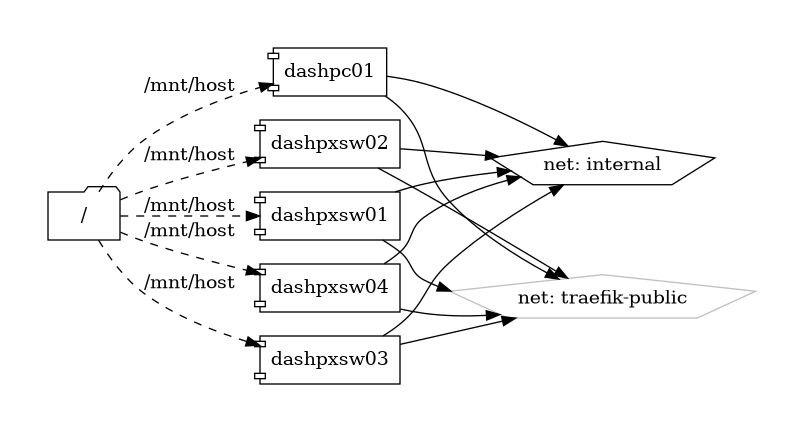Dashdot
Real-Time Server Monitoring Dashboard
Dashdot is an elegant and customizable web-based dashboard designed for real-time monitoring of your server's health and performance. With its modern and intuitive interface, Dashdot provides key insights into your server's status, helping you keep track of essential metrics and ensure optimal performance.
Key Features
Real-Time Monitoring: Track your server's CPU, memory, disk usage, and network activity in real-time, ensuring you always have up-to-date information.User-Friendly Interface: Enjoy a sleek and intuitive dashboard that makes it easy to visualize and understand your server's performance metrics.Customization: Tailor the dashboard to your needs with customizable widgets and themes, allowing you to focus on the metrics that matter most.Open Source: Dashdot is open-source, providing transparency, flexibility, and the ability to contribute to the project's development.
Getting Started
To get started with Dashdot, visit the official GitHub repository for installation instructions, configuration guides, and additional resources. Whether you are deploying Dashdot on a local server or in the cloud, the repository provides comprehensive details to help you set up and customize your dashboard.
Community and Support
Join the Dashdot community on GitHub to engage with other users, share feedback, and contribute to the project. Stay informed about the latest features, improvements, and community-driven enhancements.
Monitor your server's performance effortlessly with Dashdot—a powerful and customizable dashboard designed to keep your server running smoothly.
Volumes
Deployment
No Special requirments
Docker swarm file
version : '3.3'
services :
dashpc01 :
image : mauricenino/dashdot:5.7.0
environment :
DASHDOT_ALWAYS_SHOW_PERCENTAGES : 'true'
DASHDOT_CPU_TEMPS_MODE : avg
DASHDOT_ENABLE_CPU_TEMPS : 'true'
PGID : '911'
PUID : '911'
volumes :
- /:/mnt/host:ro
networks :
- internal
- traefik-public
logging :
driver : json-file
deploy :
labels :
traefik.http.routers.dashpc01-https.rule : Host(`dashpc01.vnerd.nl`)
traefik.http.services.dashpc01.loadbalancer.server.port : '3001'
traefik.http.routers.dashpc01-http.entrypoints : http
traefik.http.routers.dashpc01-https.tls.certresolver : le
traefik.constraint-label : traefik-public
traefik.http.routers.dashpc01-https.entrypoints : https
traefik.http.routers.dashpc01-http.rule : Host(`dashpc01.vnerd.nl`)
traefik.http.routers.dashpc01-https.tls : 'true'
traefik.docker.network : traefik-public
traefik.enable : 'true'
traefik.http.routers.dashpc01-http.middlewares : https-redirect, crowdsec-bouncer-traefik-plugin@file
traefik.http.routers.dashpc01-https.middlewares : health-rewrite@file
placement :
constraints :
- node.hostname==pc01.karam.lab
dashpxsw01 :
image : mauricenino/dashdot:5.7.0
environment :
DASHDOT_ALWAYS_SHOW_PERCENTAGES : 'true'
DASHDOT_CPU_TEMPS_MODE : avg
DASHDOT_ENABLE_CPU_TEMPS : 'true'
PGID : '911'
PUID : '911'
volumes :
- /:/mnt/host:ro
networks :
- internal
- traefik-public
logging :
driver : json-file
deploy :
labels :
traefik.http.routers.dashpxsw01-https.entrypoints : https
traefik.http.routers.dashpxsw01-http.rule : Host(`dashpxsw01.vnerd.nl`)
traefik.http.routers.dashpxsw01-http.entrypoints : http
traefik.http.services.dashpxsw01.loadbalancer.server.port : '3001'
traefik.http.routers.dashpxsw01-https.rule : Host(`dashpxsw01.vnerd.nl`)
traefik.http.routers.dashpxsw01-http.middlewares : https-redirect, crowdsec-bouncer-traefik-plugin@file
traefik.constraint-label : traefik-public
traefik.http.routers.dashpxsw01-https.tls : 'true'
traefik.http.routers.dashpxsw01-https.tls.certresolver : le
traefik.docker.network : traefik-public
traefik.enable : 'true'
traefik.http.routers.dashpxsw01-https.middlewares : health-rewrite@file
placement :
constraints :
- node.hostname==pxsw01.karam.lab
dashpxsw02 :
image : mauricenino/dashdot:5.7.0
environment :
DASHDOT_ALWAYS_SHOW_PERCENTAGES : 'true'
DASHDOT_CPU_TEMPS_MODE : avg
DASHDOT_ENABLE_CPU_TEMPS : 'true'
PGID : '911'
PUID : '911'
volumes :
- /:/mnt/host:ro
networks :
- internal
- traefik-public
logging :
driver : json-file
deploy :
labels :
traefik.http.routers.dashpxsw02-http.middlewares : https-redirect, crowdsec-bouncer-traefik-plugin@file
traefik.http.routers.dashpxsw02-http.rule : Host(`dashpxsw02.vnerd.nl`)
traefik.http.services.dashpxsw02.loadbalancer.server.port : '3001'
traefik.http.routers.dashpxsw02-https.entrypoints : https
traefik.http.routers.dashpxsw02-https.tls.certresolver : le
traefik.constraint-label : traefik-public
traefik.http.routers.dashpxsw02-http.entrypoints : http
traefik.http.routers.dashpxsw02-https.tls : 'true'
traefik.http.routers.dashpxsw02-https.rule : Host(`dashpxsw02.vnerd.nl`)
traefik.docker.network : traefik-public
traefik.enable : 'true'
traefik.http.routers.dashpxsw02-https.middlewares : health-rewrite@file
placement :
constraints :
- node.hostname==pxsw02.karam.lab
dashpxsw03 :
image : mauricenino/dashdot:5.7.0
environment :
DASHDOT_ALWAYS_SHOW_PERCENTAGES : 'true'
DASHDOT_CPU_TEMPS_MODE : avg
DASHDOT_ENABLE_CPU_TEMPS : 'true'
PGID : '911'
PUID : '911'
volumes :
- /:/mnt/host:ro
networks :
- internal
- traefik-public
logging :
driver : json-file
deploy :
labels :
traefik.http.routers.dashpxsw03-https.tls.certresolver : le
traefik.http.routers.dashpxsw03-http.entrypoints : http
traefik.http.routers.dashpxsw03-https.tls : 'true'
traefik.http.routers.dashpxsw03-https.entrypoints : https
traefik.constraint-label : traefik-public
traefik.http.routers.dashpxsw03-http.middlewares : https-redirect, crowdsec-bouncer-traefik-plugin@file
traefik.http.routers.dashpxsw03-https.rule : Host(`dashpxsw03.vnerd.nl`)
traefik.http.services.dashpxsw03.loadbalancer.server.port : '3001'
traefik.docker.network : traefik-public
traefik.enable : 'true'
traefik.http.routers.dashpxsw03-http.rule : Host(`dashpxsw03.vnerd.nl`)
traefik.http.routers.dashpxsw03-https.middlewares : health-rewrite@file
placement :
constraints :
- node.hostname==pxsw03.karam.lab
dashpxsw04 :
image : mauricenino/dashdot:5.7.0
environment :
DASHDOT_ALWAYS_SHOW_PERCENTAGES : 'true'
DASHDOT_CPU_TEMPS_MODE : avg
DASHDOT_ENABLE_CPU_TEMPS : 'true'
PGID : '911'
PUID : '911'
volumes :
- /:/mnt/host:ro
networks :
- internal
- traefik-public
logging :
driver : json-file
deploy :
replicas : 0
labels :
traefik.http.services.dashpxsw04.loadbalancer.server.port : '3001'
traefik.http.routers.dashpxsw04-https.rule : Host(`dashpxsw04.vnerd.nl`)
traefik.http.routers.dashpxsw04-http.rule : Host(`dashpxsw04.vnerd.nl`)
traefik.http.routers.dashpxsw04-http.entrypoints : http
traefik.http.routers.dashpxsw04-http.middlewares : https-redirect, crowdsec-bouncer-traefik-plugin@file
traefik.http.routers.dashpxsw04-https.entrypoints : https
traefik.constraint-label : traefik-public
traefik.http.routers.dashpxsw04-https.tls : 'true'
traefik.http.routers.dashpxsw04-https.tls.certresolver : le
traefik.docker.network : traefik-public
traefik.enable : 'true'
traefik.http.routers.dashpxsw04-https.middlewares : health-rewrite@file
placement :
constraints :
- node.hostname==pxsw04.karam.lab
networks :
internal :
driver : overlay
traefik-public :
external : true
Notes
